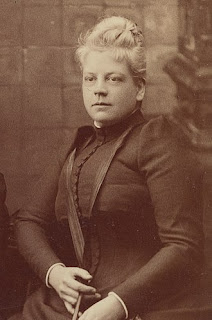Today Isabel Florence Hapgood will be commemorated by American Episcopalians as a pioneering ecumenist. Among Orthodox Christians, some may recognize her as the translator of an Orthodox service book that is still widely used today. But I believe she should be better known among English-speaking Orthodox Christians and remembered with gratitude for her contributions to Orthodoxy.
Isabel was born in Boston in 1850 into a well-off family that believed girls should receive a good education. Early on, she displayed a remarkable linguistic talent. She spent her twenties mastering numerous languages, becoming fluent in, among others, French, German, Polish, Russian, and Church Slavonic. Unsurprisingly, she went on to become a professional translator, introducing many of the greats of Russian literature to an American audience. According to her obituary in the New York Times, she was ‘one of the few members of an honorable profession who succeeded in rising above the obscurity’ and who ‘raised the middleman’s craft in world literature to the level of art’.
But her interest in Russia and Orthodoxy went far beyond translation. In the 1880s, she began travelling regularly to Russia. After her first visit, she wrote a travelogue, Russian Rambles (1887), which debunked some of the myths then associated with travel in Russia. Her reputation as a translator opened doors for her, and she quickly built up an extensive network of Russian acquaintances and friends, including Leo Tolstoy (with whom she spent the summer of 1887) and members of the imperial family. Subsequently, she visited the country almost annually.
Her love for Orthodoxy and Russia found expression in practical ways. For example, she raised substantial amounts of money for Tolstoy’s efforts to ameliorate the Russian famine of 1891–92. She also helped to organize the music for the consecration of St Nicholas Cathedral in New York.
On one of her visits, she attended Vespers at St Sophia Cathedral in Kiev. That experience was what initially inspired her to translate the Liturgy into English. It was already the policy of the Russian Church to make English the language of the Church in America, so her plans were warmly supported by successive Russian Orthodox bishops in America and she became a lifelong friend of Patriarch Tikhon. Those plans came to fruition with the publication of a first edition in 1906. However, as she pointed out in the Preface, that Service Book was only a provisional effort, and she soon set to work on a revision.
She hoped that her Service Book would establish English as the liturgical language of the Orthodox diaspora in North America. But she also hoped that it would help other churches, particularly those of the Anglican Communion, to ‘a right understanding of the Holy Orthodox-Catholic Apostolic Church of the East’.
Her visits to Russia continued until 1917. Indeed, at the time of the October Revolution, she was in the country doing research for a history of Russian Orthodox music and was forced to escape via Vladivostock.
Unable to return to Russia, she nevertheless continued to serve as a foreign correspondent to The Nation and the New York Evening Post. She also contributed articles, news reports, and feature stories to various newspapers and magazines (including the New York Times, Atlantic Monthly, and Harper’s Weekly), interpreting Russian and European culture and literature to Americans.
Here is the Collect with which Episcopalians will today remember her:
Teach thy divided church, O God, to look upon one another with a holy envy, to see what is good and right in our separate traditions, and to continually seek the unity that thou desirest for all thy people. Grant that we, following the example of thy servant Isabel Florence Hapgood, may love our sisters and brothers in Christ unselfishly and labor generously for their wellbeing, seeking not our own good but the good of others. Through the same Christ our Lord, who didst pray that his church might be one. Amen.
While, as Orthodox, we cannot agree with the pick-and-mix approach to traditions suggested by the first sentence, we should surely be able to agree with the rest and say, ‘Grant, O Lord, eternal rest unto Thy departed servant Isabel and make her memory to be eternal!’

